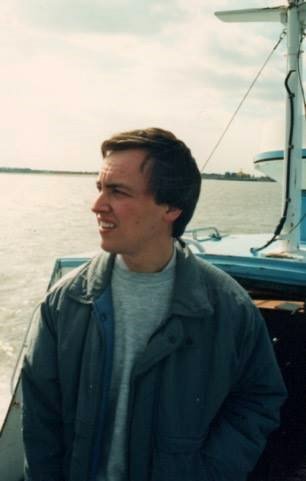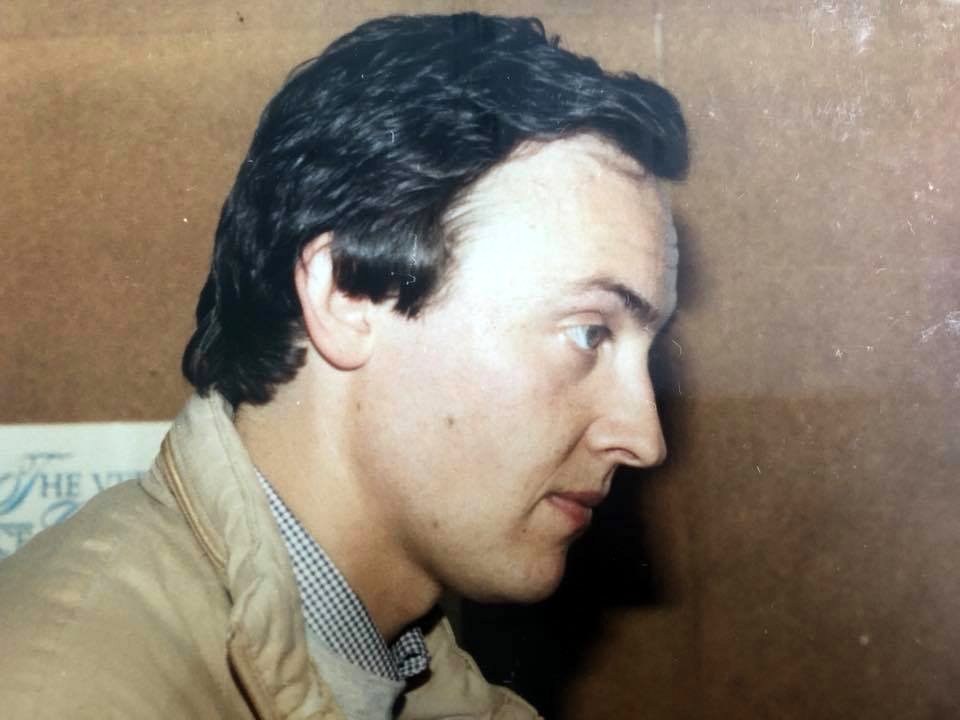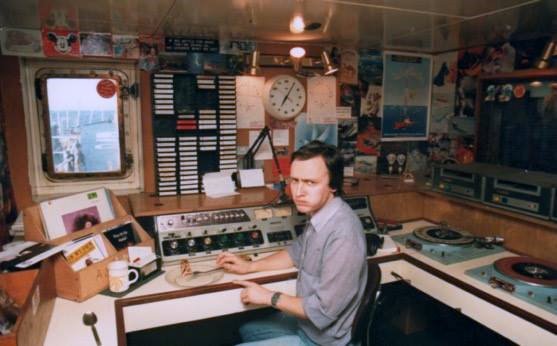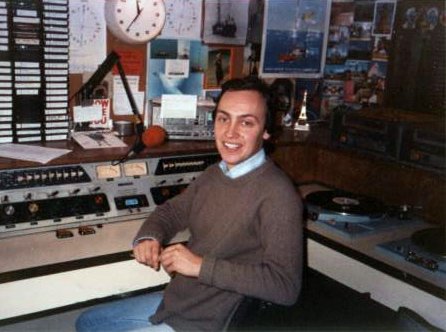|
|

|
|
Kevin Turner. Photo shared on Facebook by Dennis Jason.
|
Ray Clark has interviewed numerous people involved with Radio Caroline for documentaries and his book, Radio Caroline: The True Story Of The Boat That Rocked (reviewed here).
One of his interviewees was eighties DJ Kevin Turner.
Kevin was with Caroline from January 1986 until the end of 1987.
Ray asked Kevin for his memories of a couple of major dramatic incidents - the ship losing its anchor and going adrift, and the massive aerial tower collapsing. (Nigel Harris's recollections of the latter event, and a video, can be found
here.)
We are grateful to Ray for sharing the recording with us.
LOSING THE ANCHOR, JANUARY/FEBRUARY 1986
|

|
|
Kevin Turner. Photo kindly provided by Caroline Martin.
|
KEVIN TURNER: I remember there being quite a bit of concern over the anchor chain for, I suppose, a couple of days or so before it actually broke. This was the middle to the end of January '86, on my first stint
out there. I wouldn't claim to be any sort of sailor or know very much about the sea - certainly not at that stage - but I could see that the thing was being pulled on in a most unnatural way. It wasn't dropping down straight off the
bow like it used to. It was going around at a funny angle and the whole ship seemed to be behaving very strangely. I suppose that was probably an indication of what we later saw, that the thing had got quite badly twisted. And when
they get twisted, they weaken. I suppose it was inevitable that sooner or later the thing was going to break. And break it did, I think, right on the last day of January, from what I can make out.
 Kevin Turner on a Radio Caroline Breakfast Show in January 1986, a few days before the ship lost its anchor. This is an edited version of a recording shared by Jim Nantz. Our thanks to him (duration 3 minutes 39 seconds)
Kevin Turner on a Radio Caroline Breakfast Show in January 1986, a few days before the ship lost its anchor. This is an edited version of a recording shared by Jim Nantz. Our thanks to him (duration 3 minutes 39 seconds)
The thing that always was difficult to ascertain was whether we had actually lost the chain or not. We had an alarm on board, a Decca Navigator, and the ship's position was plotted into it. Now, in theory, if the ship strayed outside
a sort of predetermined circle as it turned on the chain in normal times, the alarm would sound. The problem was just occasionally you'd be dragging right out on the chain, or it would drag a little bit on the sea-bed, and you would
move out of that predetermined limit and the alarm would go off although you hadn't actually lost the anchor. After a bit of a flap, everyone would settle down again. But on the night that the thing actually did break, it was about
midnight. I'd been sleeping, on and off, down in the cabin. It was a fairly rough night. I heard this loud bang and the ship then started to roll in a way that I'd never really experienced before. At this point I decided my suspicions were
aroused. I decided I'd get dressed. Got up, went up to the bridge and, sure enough, the alarm was bleeping although at that stage they weren't certain if it was just another false alarm. After a while - and it wasn't very long - I
suppose about five or ten minutes - we became fairly convinced we'd lost the anchor. I remember our chief engineer Mike Barrington, for some reason I've never really worked out, decided to go
up to the bow in this filthy north-east gale that was blowing and peer over the front to see if he could see whether there was a chain there or not. As it turned out, all he could see was the chain going into the sea. Couldn't really
tell if there was a couple of feet left on the end of it beneath the water or whether there was several hundred feet. Basically though I think he just had to satisfy himself that there was a problem. Then what we had to do was start
the engine. Now that's not a simple matter on a ship the size of the Ross Revenge. An engine the size that the Ross Revenge has, you can't just turn they key and off you go. You've got to warm the thing up and that again was Mike's
job, basically to go down, start the ancillary generators that the thing has on either side of it which provide the essential bits and pieces that you need like a water pump, an oil pump and various bits and pieces. He got those
generators started and, after around twenty minutes or so of us drifting, started up the engine. The idea then was really quite simple, to turn the thing around and head into the wind, the north-easterly as it was, and head back up
the Knock Deep Channel to as close as we could get to our original anchorage.
It was all going pretty well then. I suppose about 2 o'clock in the morning or so, we were approaching what we were fairly certain was about the right place to be, and the Decca Navigator packed up. And without that, you're basically
running blind. You just don't know where you are - certainly in the middle of a gale. It's pitch black outside and you can't see navigation buoys or anything like that. So at that point we decided it was time to call the coastguard as a matter
of courtesy and probably for our own safety. They suggested we should set off some flares, which we did. I think it was reported in the papers at the time that we'd been sending off distress rockets and things like that. The actual
reason for setting off the flares was that other ships in the area hopefully would spot them and be able to give us an idea of where we really were. So we did that and we got a couple of reports back. The next thinking was “well
let's get out of the Knock Deep Channel because we're surrounded by sandbanks. Now that we know roughly where we are, we'll continue north and we'll head off and sit off Harwich. It's deep water. It's going to be a bit bumpy but at
least we won't run into any sandbanks or anything like that.” So we did that. We waited for light which came up about 7 o'clock and at that point the lifeboats found us. I think that was Sheerness and Margate who came out to us -
really just for safety's sake. We didn't actually need them but it was certainly very nice to see them. They found us, told us where we were, helped us back into the Knock Deep and basically, at that point, we were roughly back on
station.
Time to drop the spare anchor. Yeah, I know. We had one! It was amazing really (laughs). The problem though was, although we had a spare anchor, we had an anchor winch which was in pieces. So about six of us, out in this north-easterly
gale, up on the bow, we had to basically put the cogs back in it and put the top back on before it would work. It was freezing cold, I can tell you that. After about 15 minutes of struggling, we did it and, having roughly worked
out that we were where we wanted to be, dropped the spare anchor. And I say dropped. We didn't lower it. Such was the state of the winch, it was a question of Mike just hammering on the side of the thing with a dirty great mallet. Over the
side it went and, at which point, we all disappeared smartly as chains flew around everywhere. And there we were, anchored roughly in the right spot, as we thought, and hopefully the end of the drama.
 Local radio reports on Caroline's drifting, from the morning and evening of 31st January 1986. This is an edited version of a recording shared on www.azanorak.com. Our thanks
to Ray Robinson (duration 47 seconds)
Local radio reports on Caroline's drifting, from the morning and evening of 31st January 1986. This is an edited version of a recording shared on www.azanorak.com. Our thanks
to Ray Robinson (duration 47 seconds)
Unfortunately it turned out not to be the case. We began to drag the spare anchor. It turned out it wasn't bedding into the sea-bed properly. It wasn't getting a grip. We then spent about another week or so of fairly unpleasant times.
It is tiring when you're in a situation like this because you can never go to sleep for very long. Every time it seemed the tide turned and a different current caught the ship, we'd begin to drag the anchor. Then it was a question of
having to start up the engine and manoeuvre, dragging the spare as we went actually at that stage. Eventually, I think it was after the first week or so of February, the Dutch turned up with a big tug, a big new chain and with them
we were able to lay quite an impressive-looking new anchor and chain. I think it was about the 10th February when we were finally secure and the drama was over. And thank goodness.
The main thing afterwards that everybody pointed out was how lucky we'd been because only, I think, two days before we lost the chain at the end of January, we'd had a fuel tender out, delivering quite a substantial quantity of fuel. Had
that not been the case, I don't think we'd have had enough fuel to start the engine as often, and use it as often, as we did in that ten day period.
 With the new anchor fitted, everything is back to normal. Kevin Turner is on the Caroline-558 Breakfast Show on 14th February 1986. This is an edited version of a recording shared on the Internet Radiocafé, now known as the
Radiotrefpunt (radio meeting point) forum, by Vincent. Our thanks to him (duration 3 minutes 9 seconds)
With the new anchor fitted, everything is back to normal. Kevin Turner is on the Caroline-558 Breakfast Show on 14th February 1986. This is an edited version of a recording shared on the Internet Radiocafé, now known as the
Radiotrefpunt (radio meeting point) forum, by Vincent. Our thanks to him (duration 3 minutes 9 seconds)
 Six months later, Kevin on the Caroline-558 Breakfast Show of 14th August 1987. This is an edited version of a recording kindly provided by Hans Knot (duration 3 minutes 37 seconds)
Six months later, Kevin on the Caroline-558 Breakfast Show of 14th August 1987. This is an edited version of a recording kindly provided by Hans Knot (duration 3 minutes 37 seconds)
LOSING THE AERIAL TOWER, NOVEMBER 1987
|

|
|
Kevin Turner looking grumpy in the Radio Caroline studio. Photo shared on Facebook by Dennis Jason.
|
I do remember there'd been a very rough afternoon and evening. Very high waves. In fact, standing in the studio in the evening with Tim Allen, I was amazed. I don't think I'd ever
seen seas that high. The tops of the waves were coming back across the ship about the same height as the studio window - and that's a good seven feet off the deck level - so goodness only knows how high the seas really were that night.
Dinner had been a complete farce. I think we'd ended up eating quite late and I don't know how much of it was eaten and how much ended up on the floor. I suspect most of it. It was a difficult day to put it mildly and I went to bed about 9
o'clock. I couldn't sleep because all the doors were banging and all sorts of crashes and bangs were coming from upstairs. I gather one of them was the cooker breaking loose and careering round the galley. Eventually, about 2 o'clock
or so, after dozing on and off, the alarm bell went off. I was woken by that and then promptly by Keith Francis who burst into my cabin and came out with the phrase “I think we've lost the
tower”. I remember - I suppose probably when I'm just about awake I'm not at my best (laughs) and was slightly irritated - I said “what do you mean? We've either lost it or we haven't”. And he said “it's
gone”. Threw me a lifejacket; got that on; went up to the bridge; found (Chief Engineer) Chicago and (Captain) Ernie up there, basically in communication with the coastguard, explaining the
situation and looking at the wreckage which was hanging over the starboard side. Because of that, the ship was listing quite badly and I think we were a bit concerned about how stable she was. She was certainly bobbing around like a
cork as Ernie was able to explain because she was ballasted for a tower which she didn't have any more.
|

|
|
Kevin Turner looking happier in the Radio Caroline studio. Photo courtesy of Nick Bolland.
|
We all assembled in the mess room at that stage. Having spoken with the coastguard and explained the situation, Ernie outlined the options which were to stay put and he said “I think we're reasonably safe here. I don't think
she's going to turn over. Or you can get into the liferaft, boys, and, if that's what we decide, that's what we'll do. We'll split into two groups and we'll tie them off the back of the ship and wait for helicopters or lifeboats or
whatever”. His recommendation was to stay on board because it would be considerably warmer and dryer and (laughing) I think too there was some concern as to whether any of the liferafts on board were still within their dates,
within their service dates, but anyway it was decided that we would stay on board. It wasn't a pleasant time. Daylight came up and we could all see the mast hanging over the side. The stays were holding whatever it was that remained of
it and Chicago and Ernie tried, with some success, to cut one or two loose because there was concern about it banging against the side of the ship. Unfortunately, as they cut one, the whiplash effect of this piece of taut metal was a bit on
the dangerous side and it was then decided not to attempt any more. We actually lost the mast the following night. The action of it rubbing against the side of the ship, the stays and things like that, meant that we lost
it.
A few days then followed of fairly uncomfortable weather which eventually died down and allowed a tender to come out. It was explained to me at that point “you go off. You're more use to us on shore”. I am a broadcaster,
I'm not an aerial constructor, and there wasn't going to be a lot of broadcasting for the next few days from what we could see. And that was the point at which I left the ship for the last time. December of '87 I think, just a week or so
before Christmas.
As we pulled away, it wasn't the spectacular sight that we were used to seeing as we arrived or departed, a ship with a magnificent tower. It just looked like a rather sad-looking fishing boat, stuck out in the middle of nowhere and
not doing the thing that everyone expected of it - which was broadcasting.
Back to Ray's chat with Emperor Rosko.
Ray's conversation with Tom Anderson is over the page.
|

